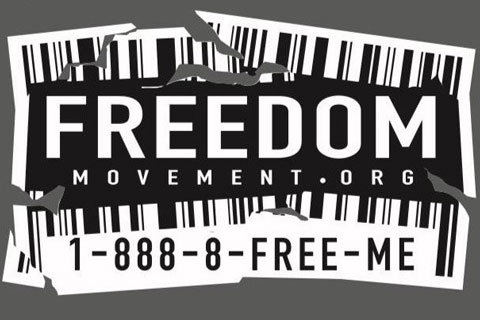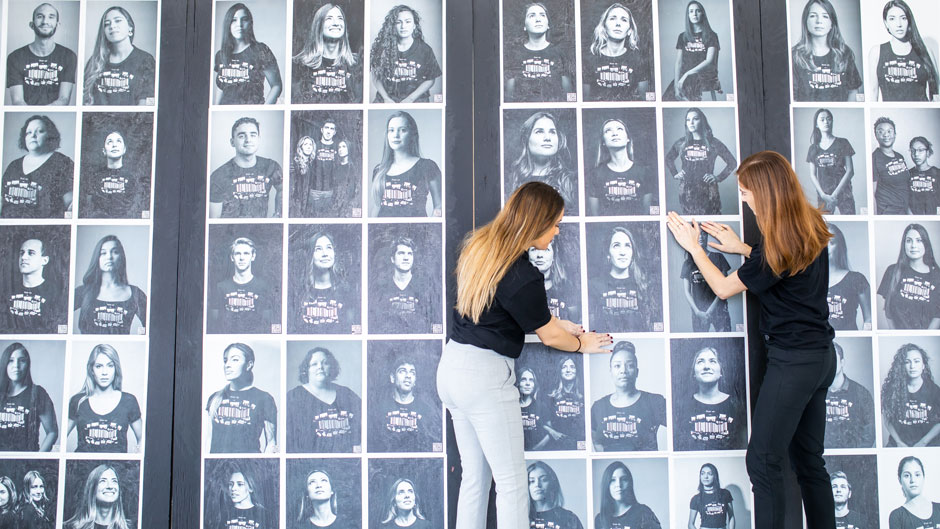Medical students with the University of Miami Miller School of Medicine are hoping a high-profile temporary tattoo will help combat human trafficking during Super Bowl weekend in Miami-Dade County. The tattoo, which will be highlighted on social media outlets, shows the image of a broken barcode.
“Historically, many traffickers will brand their victims with a tattooed barcode as a sign of property,” said Isabella M. Ferré, a second-year medical student who is leading the effort—alongside fellow area student activists, University of Miami Health System providers, law enforcement, and community partners—to spread awareness of the plight of victims and increased activities associated with high-profile tourism events such as the Super Bowl.
 The students designed the tattoo to symbolize that no child or person is for sale. The tattoo also contains the national trafficking hotline number, which hopefully will provide a lifeline for those who might need the number, said Ferré. University medical students and a local documentary producer, who formed the Freedom Movement antihuman trafficking initiative, plan to promote the broken barcode emblem at events throughout the weekend.
The students designed the tattoo to symbolize that no child or person is for sale. The tattoo also contains the national trafficking hotline number, which hopefully will provide a lifeline for those who might need the number, said Ferré. University medical students and a local documentary producer, who formed the Freedom Movement antihuman trafficking initiative, plan to promote the broken barcode emblem at events throughout the weekend.
“Barcodes are one of the major types of branding marks by traffickers,” said Jazlyn Merida, a second-year medical student. “Many of these barcode tattoos will scan with a smartphone, placing a monetary value to that individual. This is only one type of branding variation and it is a psychological methodology to force an individual to relinquish his or her free will.”
This Super Bowl weekend, Ferré, fellow University students, and activists with the Freedom Movement are partnering with influencers to wear the tattoo. “Our emblem isn’t a barcode. It’s a shattered barcode,” said Ferré. “This is a symbolically rich statement against all forms of trafficking—such as sexual exploitation, labor, and organ harvesting. The emblem also hopes to evoke empowerment, as it shatters every negative and unhealthy emotion associated with a branding.”
As part of a larger antihuman trafficking effort with University of Miami Health System providers, Miller School public health experts, and UM/Jackson Memorial Hospital, the medical students (formerly named Code Rise) recognized trafficking as a problem in their community and further mobilized efforts to bring about social change. Student organizers realized that human trafficking transcended all sectors of society and the public needed to be made aware of this pervasive social issue.
“The medical community plays an integral role in stemming human trafficking,” said JoNell Potter, professor of clinical obstetrics, gynecology, and reproductive sciences at the Miller School of Medicine. With guidance from Miller School faculty—who have launched efforts to provide health care resources and educate the medical community on recognizing trafficked victims seeking medical help—students have been working to bring awareness to heightened trafficking activity during the Super Bowl and other events that draw tourists to South Florida.
“The students are part of a growing community of advocates who saw this as an urgent need and have continuously devised new creative tools and platforms to build awareness and help victims,” Potter said.
Several initiatives for issues related to human trafficking are taking place across the University.
The School of Nursing and Health Studies recently hosted a special event to bring human trafficking to the forefront of health education. The event included a talk by Katherine Fernandez Rundle, Miami-Dade state attorney, who detailed the harsh realities of human trafficking in South Florida; remarks by Dean Cindy L. Munro, who said the school is working with stakeholders to create a simulation-based curriculum that addresses in real-time the complexities health providers face in recognizing and responding to patients enslaved by traffickers; and a human trafficking recognition scenario in the school’s Simulation Hospital Emergency Department.
Caitlyn Burnitis, a third-year student in the School of Law, founded the Miami Law Alliance Against Human Trafficking, which works to educate the student body and the community on this important public health crisis through programming such as seminars and speakers. In late January, the alliance hosted “Sharing the Playbook: How Advocates and Organizers are Addressing the Human Trafficking Concerns of Super Bowl LIV.’’
The School of Education and Human Development’s Erin McNary, assistant professor of kinesiology and sport sciences, organized the school’s recent Fifth Annual Sport Industry Conference, which included a panel—“Trafficking, Sports, and The Spike”—that addressed human trafficking surrounding large sporting and entertainment events. McNary is co-chair of the Miami Super Bowl Host Committee/Women’s Fund of Miami-Dade Official Stop Sex Trafficking Campaign.

